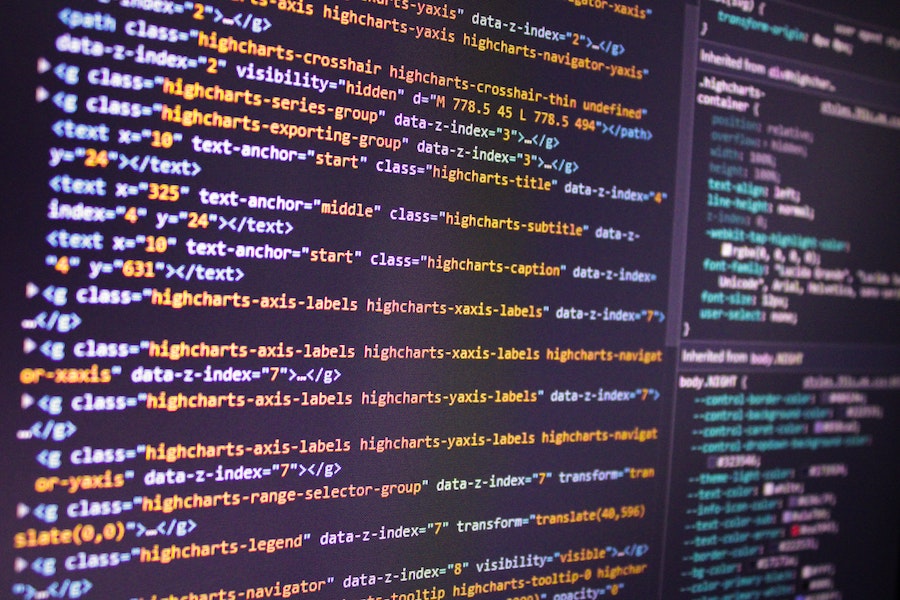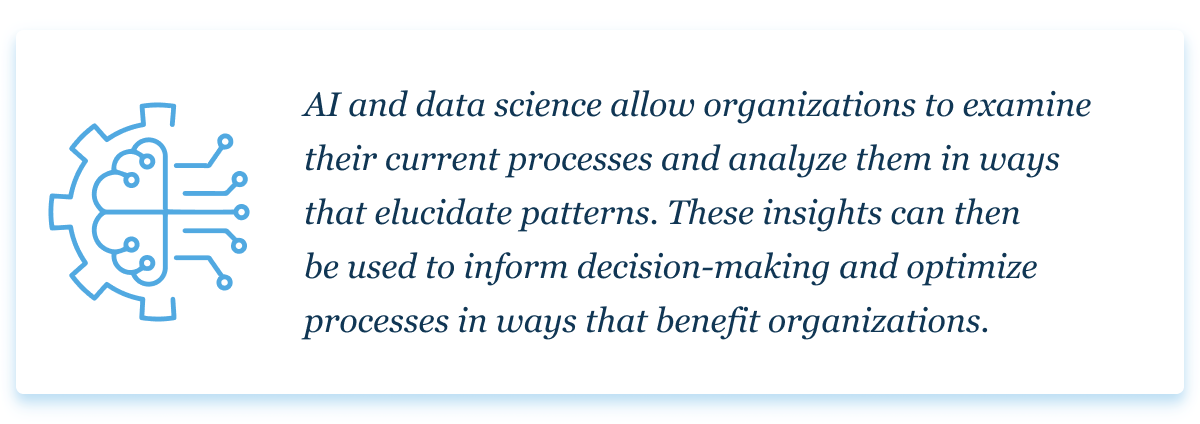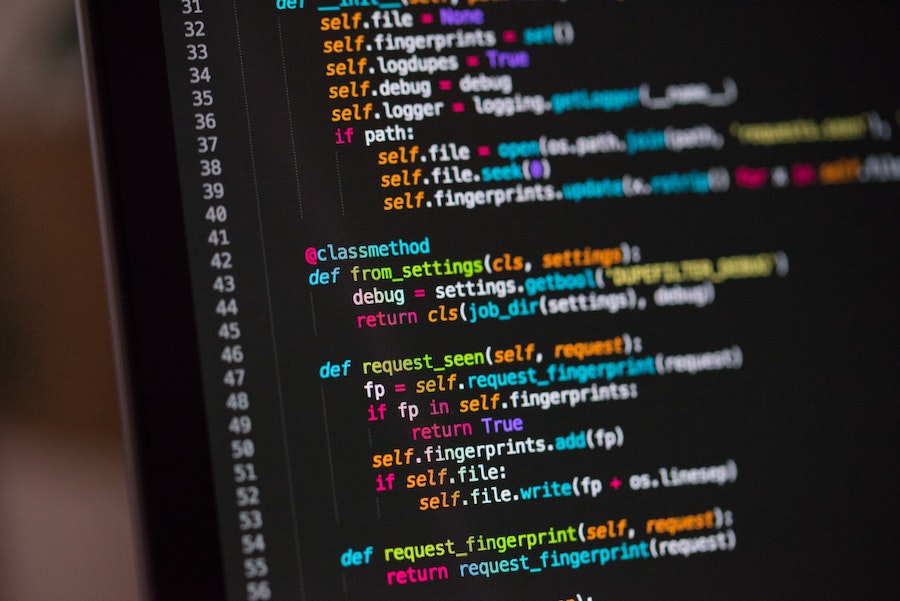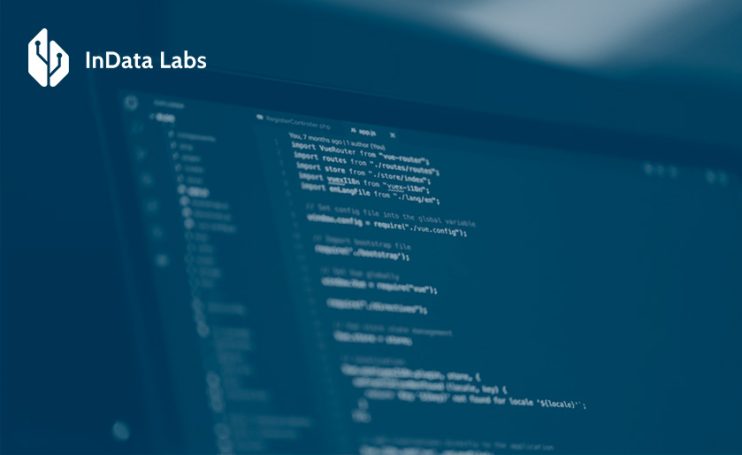The role of AI in data science has grown significantly over the last decade. As AI technology has become more applicable in a variety of contexts, data scientists have been taking greater advantage of it in their approach to data analysis. Both of these fields are having a significant impact on various aspects of society ranging from how individuals communicate to how organizations engage in business processes.
Though they are still evolving, these fields are starting to have an exciting impact on the world around us that is growing with each passing day. Understanding the relationship between data science, artificial intelligence, and machine learning in today’s world, along with the difference between data science and AI, can give one a more nuanced understanding of how technology is evolving as we move deeper into the future.
Here are the twelve facts about data science and AI in today’s evolving world.
#1: AI makes data science more powerful
In its most rudimentary form, data science doesn’t require the help of AI. However, without the help of AI technology, data science is severely limited in its scope. AI allows data science to be performed at a much more advanced level, organizing data as disparate as voice recordings and consumer buying history into usable sets of data that can be used to inform the decision-making process in significant ways.

Source: Unsplash
#2: AI makes data science faster
One of the most remarkable aspects of AI technology is its ability to streamline a range of tasks. As it pertains to data science, being able to speedily collect, organize, and analyze data for patterns can make a dramatic difference in processes. Rather than a human having to manually perform all of these tasks, AI technology allows humans to take a broader role in data science while AI quickly takes care of many otherwise long and laborious tasks.
#3: AI and data science are becoming normalized in many industries
The world has changed in many key ways over the last several decades. One interesting and exciting change is the fact that data science and AI are becoming normalized in many industries ranging from healthcare to manufacturing.
Though this is due to several factors, one of the main factors is the fact that technologies that perform these processes have become more accessible. As a result, more and more organizations have begun to capitalize on this accessibility and reap the rewards of utilizing data science and AI.

Source: Unsplash
#4: Data science is causing machine learning to advance
Machine learning is a subcategory of data science that focuses on AI technologies with the ability to learn from experience and change their functions accordingly. However, machine learning can’t be created and implemented without the use of data and data science principles. This being the case, data science can be seen as a key and instrumental aspect of all developments in the field of machine learning.
#5: Data science and AI help organizations reduce costs
In any field of business, reducing costs wherever possible can play an important role in growing and maintaining a business.
Today, data science and AI processes are allowing organizations to be extremely effective in their efforts to identify areas to cut costs. This is done by collecting pertinent organizational data and then using AI technology to search for areas where current spending levels are unnecessary. As time progresses, it’s more than likely that this will become a normalized process used to reduce costs in businesses of all sizes.

Source: Unsplash
#6: Organizations use data science and AI to understand consumers
For pretty much anyone who has been using the Internet over the past decade, it’s more than likely that companies have been using their actions as data to better understand consumers. This is because most organizations utilize their websites and sales data to gain deeper insights into their consumers’ desires and psychology.
To do this as effectively as possible, however, organizations are tapping data science and AI technology to automate the processes of collecting and analyzing consumer behavior. With these insights, organizations are then able to make better business decisions getting help from the top data science companies.
#7: AI and data science are making waves in healthcare
In healthcare, improving processes has the potential to improve the health of the public and even save lives. This being the case, the impact that data science and AI have had on the healthcare field can’t be understated. AI-powered data science technology has allowed healthcare to improve in a number of ways ranging from diagnosing patients more effectively to discovering new treatment drugs faster and more effectively.
In addition, new applications for AI and data science in healthcare are being discovered with each passing year, making it likely that these technologies can be the catalyst for a tremendous amount of advancement in the field.

Source: Unsplash
#8: Chatbots are advancing as a result of data science in AI
Today, website chatbots have become a normalized part of most people’s everyday existence. However, many are beginning to notice that what were once extremely clunky and obviously non-human chatbots are now becoming harder to distinguish from real human beings.
The reason for this is advances in both data science and AI technology which are allowing chatbots to be powered by machine learning to perform better in their roles over time. In the near future, these machine learning-powered chatbots may become impossible to distinguish from real human beings for the average consumer.
#9: Banks and financial institutions are benefitting from AI and data science
Within banks and financial institutions, pinpointing fraud can be a difficult task. This is especially the case with larger institutions that have to sift through scores of transactions each day. Data science and AI have presented themselves as viable solutions to this problem that have the power to transform these industries.

#10: AI is allowing data scientists to analyze images and videos
What was once an aspect of science fiction stories is now becoming a reality as AI technology is allowing data scientists to analyze images and videos rapidly and effectively. In essence, these technologies are programmed to detect certain patterns or characteristics in images and videos. In addition, this type of analysis can now be done rapidly using large data sets.
As a result, data scientists now have the ability to help a range of organizations benefit from image and video data that was once useless to them.
#11: Cybersecurity is benefiting as a result of advances in AI and data science
As the world has become more digital over the past several decades, cyberattacks have become larger and more looming threats.
Thankfully, data science and AI have begun to be utilized in effective ways to combat cyber criminals in several key ways. One way in particular is through the use of AI technology to learn user-behavior in order to better detect possible security breaches. By taking advantage of data in this way, cybersecurity organizations are able to craft more effective cybersecurity software that can keep individuals and companies safe.

Source: Unsplash
#12: AI and data science are being used to optimize operations
In any organization, optimizing processes can make operations more efficient, productive, and cost-effective. This is especially true when it comes to manufacturing and transporting goods and materials.

What is AI in data science?
Anyone interested in the development of technology in today’s rapidly evolving world has likely asked themself, “What is AI in data science?” To answer this question thoroughly, it’s important to understand the difference between data science and artificial intelligence.
Data science is a field that involves analyzing sets of data to glean certain insights. These insights are then used to inform decisions and actions, thereby taking some risk out of certain processes and providing more clarity to various situations. Many people curious about the field wonder if data science involves coding.
The short answer is yes, and data science companies must have data scientists that are well-versed in various coding languages. However, new technologies are simplifying data science processes and may one day evolve to the point that coding knowledge is no longer needed to engage in advanced data science processes.

Source: Unsplash
Artificial intelligence, on the other hand, is a field that aims to create machines and software that are able to mimic the reasoning capabilities of the human brain. This technology can be applied to a variety of contexts ranging from AI-powered diagnosing machines in healthcare to Big data AI for businesses.
The use of AI in data science
The use of AI in data science can’t be understated as it has become an increasingly integral part of data analysis processes across a range of industries. For data scientists, AI can be utilized as a powerful tool that helps them achieve a range of goals and perform a variety of processes. In particular, AI allows data scientists to perform a range of data-related tasks virtually instantaneously and without the chance of a human error occurring.
For many individuals who are curious about the impact of data science on other technological fields, the question “Is AI or ML better for data science?” commonly arises. In truth, both AI and machine learning processes can be utilized in data science to streamline certain functions and make approaches to analyzing data more effective.
How AI is used in data science
When it comes to understanding how AI is used in data science, it can be helpful to look at some key examples. Some common ways in which data scientists utilize AI technology in today’s technological landscape include:
Segmentation
In data science, organizing and segmenting data into specific groups is a useful practice. This is because deeper analysis can be done when grouping data sets according to different criteria. AI technology can streamline the process of segmentation for data scientists by rapidly detecting certain patterns and segmenting data accordingly.

Source: Unsplash
Predictions
One of the biggest and most significant ways data science is being used by organizations today is in predicting trends in the market. AI technology now has the power to utilize historical data to create predictions for the market, such as which products consumers are likely to want in the future. This technology makes it far easier for data scientists to make market-specific predictions.

Source: Unsplash
Recommendations
Most people living today utilize some form of music or video streaming service. For streaming service companies, ensuring that users are happy with their platform and use it for long periods of time is a priority.
By taking advantage of AI technology, data scientists at these companies are able to craft algorithms that provide users recommendations they’re likely to enjoy based on their past data as well as the data of other users with similar interests.

Source: Unsplash
Data management
Data management is a broad process that includes an assortment of steps ranging from the collection of data to the data analysis of Big data. The ultimate aim of data management is to benefit organizations in various ways by taking advantage of data. AI is often used by data scientists in the data management process to automate and streamline a number of steps in the process, making data management both easier and faster.
As time goes on, AI technology continues to play a greater and greater role in the field of data science. Ultimately, it is more than likely that the two fields and their processes will eventually become inextricable from each other.
The role of data science in artificial intelligence
There are some out there who are under the impression that data science and AI are interchangeable fields and ask questions such as “Will data science be replaced by AI?” The short answer to this question is no, as AI technology actually relies on data science in several key ways.
Just as AI technology helps data scientists analyze data in many ways, data science also plays an important role in the development of AI technology. Understanding the role of data science in artificial intelligence can help provide one with a deeper understanding of both distinct fields.
What is machine learning?
To comprehend how the field of data science informs AI technology, it’s important to understand what machine learning is. Put simply, machine learning is a subcategory of AI that focuses on machines that are able to learn and evolve on their own.
AI technology that uses machine learning is able to do this through the use of data science principles, drawing upon sets of data to find patterns and making decisions based on these insights.

Source: Unsplash
In essence, machine learning allows technologies to learn and develop new insights that inform their actions. In this way, machine learning technology has the power to mimic some functions of the human brain and human reasoning by learning to do new things over time by learning from experiences.
To function, machine learning technologies utilize predictive models. Predictive models are a type of algorithm that uses data science principles to draw upon historical data to create insights that can be utilized in the future. These algorithms help machine learning technologies change how they act and respond to various situations over time.
However, though predictive models allow machine learning technology to glean impressive insights from data, it must be noted that the data that is being utilized can have a dramatic effect on the efficacy of machine learning technology. This being the case, drawing upon data science principles and fundamentals that revolve around effectively collecting and referring to accurate and useful data plays a key role in the development of machine learning technology.
Examples of data science in AI
To truly get a sense of the way data science is applied to AI, it can help to look at some specific instances. Here are some common examples of data science in AI and machine learning:
Chatbots: Chatbots utilize data from previous customer interactions to help customers find help and solutions to certain problems. For example, if a customer asks, “How do upgrade my account?” the chatbot will draw upon data and provide an appropriate answer to the customer. By drawing upon data science principles to decide how to respond to various prompts, chatbots are an AI technology that utilizes data in significant ways to function.
ChatGPT that recently has gained pretty much attention, has a lot to offer to businesses in need of providing more accurate responses and better customer service to their clients. ChatGPT allows to understand customer needs and preferences, be available to chat 24/7 and answer questions. Implementing ChatGPT, businesses can become more technology driven and reap the benefits of automation and tech intelligence.

Source: Unsplash
Language translators
In today’s modern world, language translation applications and software have become useful tools for facilitating intercultural communication. This AI software are able to function by utilizing data from various languages and words to make instantaneous language translation possible through natural language processing without the intervention of a translator. As such, data scientists working in tandem with AI technology have the power to transform the way people interact with each other across the world.

Source: Unsplash
Healthcare diagnosis software
Healthcare has evolved with the rise of new technologies that have the power to make healthcare professionals more effective in their roles. In particular, healthcare diagnosis software that uses both data science and AI processes helps diagnose patients by drawing upon data from other patients with similar traits and symptoms to make more accurate diagnoses. This is a prime example of AI software drawing upon data science to function and generate actionable insights that have a profound impact on people’s lives.

Source: Unsplash
The role of Big data in AI and data science
Big data is a term that is commonly used to refer to Big data sets that house a large amount of information. Though extremely useful insights can be gleaned from Big data, they are incredibly difficult to organize and analyze. Thankfully, AI technology has emerged as a solution for tackling Big data and using it effectively.
Machine learning algorithms can effectively organize, analyze, and glean insights from Big data in a variety of fields and settings. This means that organizations now have the power to extract truly significant information from Big data sets that were previously close to impossible to utilize effectively.
As such, Big data in AI is playing a key role in a range of organizations across industries adopting AI and machine learning processes into their operations.
Fields that data science and AI are impacting
While data science and AI are beginning to change culture as a whole in some broad ways, it is having an acutely profound impact on several particular industries. Understanding which industries these technologies are having the most profound consequences in and how they are doing so can provide one with a deeper and more nuanced way in which industries are evolving as a result of technological innovations.
Artificial intelligence and data science in the automotive industry is a particularly exciting topic in today’s evolving world. Specifically, the public has become fascinated with the idea of self-driving vehicles entering the scene. AI technology can be applied to both commercial delivery and to people’s personal vehicles, making it an extremely exciting development that has the potential to alter the world as we know it.

Source: Unsplash
AI and data science in trading is another compelling topic that is being closely watched by both professionals and members of the public. In particular, AI is being utilized to analyze past data to detect signals in the market.
Users of these AI-powered software can then use these insights to engage in trading practices that have a greater chance of yielding higher returns in the market. Positive examples of AI and data science in trading highlight the power of Big data and AI being applied in different industries.
AI and data science in retail is another exciting topic that the public is gaining interest in. Specifically, retail organizations are utilizing data science and AI capabilities to predict and forecast trends that will arise in the market. This can both make them better prepared to deal with changes in consumer preference as well as give them a competitive edge over other retailers in their space.
As time goes on, the practice of drawing upon data science and AI will likely become a normalized part of retail organization operations.
The role of AI scientists and consultants in an evolving world
As AI technologies become more advanced and attainable to a variety of organizations in a range of industries, the roles of AI scientists and AI consultants will continue to take on a greater sense of importance in our society. AI scientists are the individuals who craft and iterate AI technology and software. Their work is what makes AI technology functional and applicable to a wide array of contexts.
AI consultants, on the other hand, are professionals whose role is to assist various organizations in integrating AI technology into their processes. These professionals may help retailers utilize AI to predict demands, financial institutions create AI-powered processes to make investing less risky, or streaming services create more accurate recommendation processes.

Source: Unsplash
As time goes on and AI technology becomes more and more of a normalized part of society, the skills and knowledge of AI scientists and AI consultants will rise in demand. This being the case, these job roles seem like incredibly prudent career options for young professionals interested in tech to pursue.
Ethics in data science and AI
When it comes to artificial intelligence and data science, ethical concerns have become an increasingly contentious topic. Though these technologies have an immense ability to positively transform and streamline a range of processes, taking advantage of these capabilities may also sometimes cross some important ethical lines. These concerns highlight the business ethics that must be established as organizations move forward with the utilization of these technologies.
One specific ethical topic surrounding these technologies is levels of transparency. If companies or individuals use AI-powered technology, is it unethical? Though there are a variety of opinions pertaining to this topic, many believe that the answer lies in transparency. If organizations and individuals are honest about the fact that they are utilizing AI to create things and make decisions, this may be seen as a more ethical process than being secretive about the fact.
In addition to transparency around utilizing AI technology, consent has also arisen as an important ethical topic in the discussion. Many are beginning to feel that organizations utilizing AI in ways that users interact without their consent is unethical. This seems to indicate that countries will have to begin to become more specific about laws surrounding AI and the need to gain consent from individuals before using AI to interact with or gain information from them.

Source: Unsplash
When it comes to online shopping, many organizations use AI to provide consumers with products and stimuli that make them most likely to make a purchase. While most organizations utilize some form of coercion to stimulate consumers to make a purchase, such as advertisements and limited-time sales, some believe that using AI for this aim is going too far. Though it will be a difficult task, it will be up to organizations and government bodies to determine where the lines are that shouldn’t be crossed with the utilization of AI in online shopping contexts.
Much like the field of cybersecurity draws upon ethical hackers to detect flaws in their systems, AI companies will likely begin to do the same in the coming years. By being proactive about detecting ethical concerns and flaws in AI systems, organizations will be able to quell public concerns and safeguard themselves from legal repercussions.
What jobs will survive AI?
Today, though there is much excitement surrounding breakthroughs in AI technology, some people are worried about the negative impact that AI may have on society and the workforce. In particular, many critics of AI are wondering “What jobs will survive AI?” and “What jobs cannot be replaced by AI?”
While AI has the power to streamline many processes for various professionals and perform advanced functions, there are many job roles that will still require a human to perform them for some time. Some roles that will surely be safe for the time being include teachers, counselors, and medical professionals. This is because, while AI technology may be able to aid these professionals in performing their duties, it’s not yet advanced enough to mimic the role of a thinking human in all forms of human interaction and thought.

Source: Unsplash
As such, though many are worried about AI taking jobs from professionals in a significant way, we’re not yet at a place in history where the technology is advanced enough to truly act in the capacity of a human. This being the case, though AI may be able to streamline processes such as collecting and analyzing market analytics, it’s not yet able to replace the professionals who oversee these processes and utilize the insights gleaned by them.
Is Python a must in AI?
For those with a deep interest in AI technologies, the question of which programming languages are most essential to the field is a common topic for exploration. In particular, many wonder if Python is a must in AI technology and processes.
As it stands now, Python is one of the most vital programming languages used in the development of AI technology and machine learning algorithms. This being the case, it can be said that Python currently plays an important and key role in the creation and iteration of AI.
Is AI becoming sentient?
In pop culture and science fiction, a commonly explored topic is that of artificial intelligence systems becoming sentient. While there are currently amazing advancements being made in AI technology, there is no real threat of AI becoming sentient in the near future.
As of right now, AI systems operate by referring to models and algorithms to dictate how they behave. So, while they may effectively seem to mimic human intelligence, these forms of technology are not actually thinking for themselves. Getting AI to a place in which it actually functions in the same manner as human intelligence is a distant concept that does not yet have any place in reality.

Source: Unsplash
However, as predictive models and other AI algorithms become more complex, it may become more difficult for humans to distinguish between AI technology and human-powered processes.
AI in data science is having a profound impact on the world
Over the last several years, advances in both data science and artificial intelligence have had a profound impact on changing the world. In particular, the interplay of data science, artificial intelligence, and machine learning has begun to usher technology into a new realm that is having a dramatic impact in a variety of contexts.
From helping businesses forecast future trends by looking at historical data to creating cars that can drive safely without human intervention, these technologies are rapidly altering the ways organizations function and individuals interact with the world. As time goes on, it is more than likely that these technologies will become a normalized part of everyday life across the world.
Disrupt your business with data science and AI
In need of data science and AI technologies for your company? Reach out to our experts and let us know what we can do for you.



